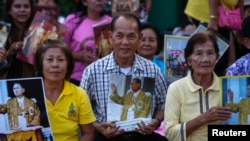Thai Prime Minister Yingluck Shinawatra has easily survived a no-confidence vote in parliament, where her party controls the majority of seats.
Lawmakers in Bangkok voted 297 to 134 on Thursday against a measure that would have unseated her because of allegations of corruption.
Meanwhile, opposition protesters expanded their demonstrations across the capital Wednesday, vowing to take over every government ministry until Prime Minister Yingluck resigns.
The protesters have taken over parts of the finance and foreign ministries and surrounded the interior ministry, and police said Thursday that protesters have pulled down several electrical cables outside police headquarters and an adjacent hospital, forcing them to use backup power.
Prime Minister Yingluck has refused to step down and has called for dialogue to resolve the situation. She has vowed not to use violence to stop the protests.
VOA correspondent Steve Herman, who is in Bangkok covering the protests, said that it is not certain the protesters can achieve their goals.
"There's some skepticism, if you're objective here, as to whether these street demonstrations actually will be able to sustain the momentum to cause some sort of action that would either a) force the government to resign, b) bring about a military coup, or c) some sort of judicial intervention that would also declare this government invalid," said Herman.
He says even if the government did step down, the move would not transfer any power to the opposition Democrat Party.
"The bottom line is, if the government were to resign and there were to be new elections called, the Democrats have virtually no chance of winning. The party led by Prime Minister Yingluck Shinawatra would have the vote," continued Herman.
The street protests are the largest in Thailand since 2010, when more than 90 people were killed in a military crackdown on an opposition protest.
The latest protests were triggered several weeks ago by an amnesty bill that would have allowed former prime minister Thaksin Shinawatra, Yingluck's brother, to return home and avoid a two-year jail term for corruption. That amnesty bill was rejected by the Senate, but opposition-led protests have continued.
Yingluck came to power in 2011. Thaksin was toppled by a coup in 2006 and convicted of corruption. He has lived in exile to escape the charges, which he says were politically motivated.
Lawmakers in Bangkok voted 297 to 134 on Thursday against a measure that would have unseated her because of allegations of corruption.
Meanwhile, opposition protesters expanded their demonstrations across the capital Wednesday, vowing to take over every government ministry until Prime Minister Yingluck resigns.
The protesters have taken over parts of the finance and foreign ministries and surrounded the interior ministry, and police said Thursday that protesters have pulled down several electrical cables outside police headquarters and an adjacent hospital, forcing them to use backup power.
Prime Minister Yingluck has refused to step down and has called for dialogue to resolve the situation. She has vowed not to use violence to stop the protests.
VOA correspondent Steve Herman, who is in Bangkok covering the protests, said that it is not certain the protesters can achieve their goals.
"There's some skepticism, if you're objective here, as to whether these street demonstrations actually will be able to sustain the momentum to cause some sort of action that would either a) force the government to resign, b) bring about a military coup, or c) some sort of judicial intervention that would also declare this government invalid," said Herman.
He says even if the government did step down, the move would not transfer any power to the opposition Democrat Party.
"The bottom line is, if the government were to resign and there were to be new elections called, the Democrats have virtually no chance of winning. The party led by Prime Minister Yingluck Shinawatra would have the vote," continued Herman.
The street protests are the largest in Thailand since 2010, when more than 90 people were killed in a military crackdown on an opposition protest.
The latest protests were triggered several weeks ago by an amnesty bill that would have allowed former prime minister Thaksin Shinawatra, Yingluck's brother, to return home and avoid a two-year jail term for corruption. That amnesty bill was rejected by the Senate, but opposition-led protests have continued.
Yingluck came to power in 2011. Thaksin was toppled by a coup in 2006 and convicted of corruption. He has lived in exile to escape the charges, which he says were politically motivated.







